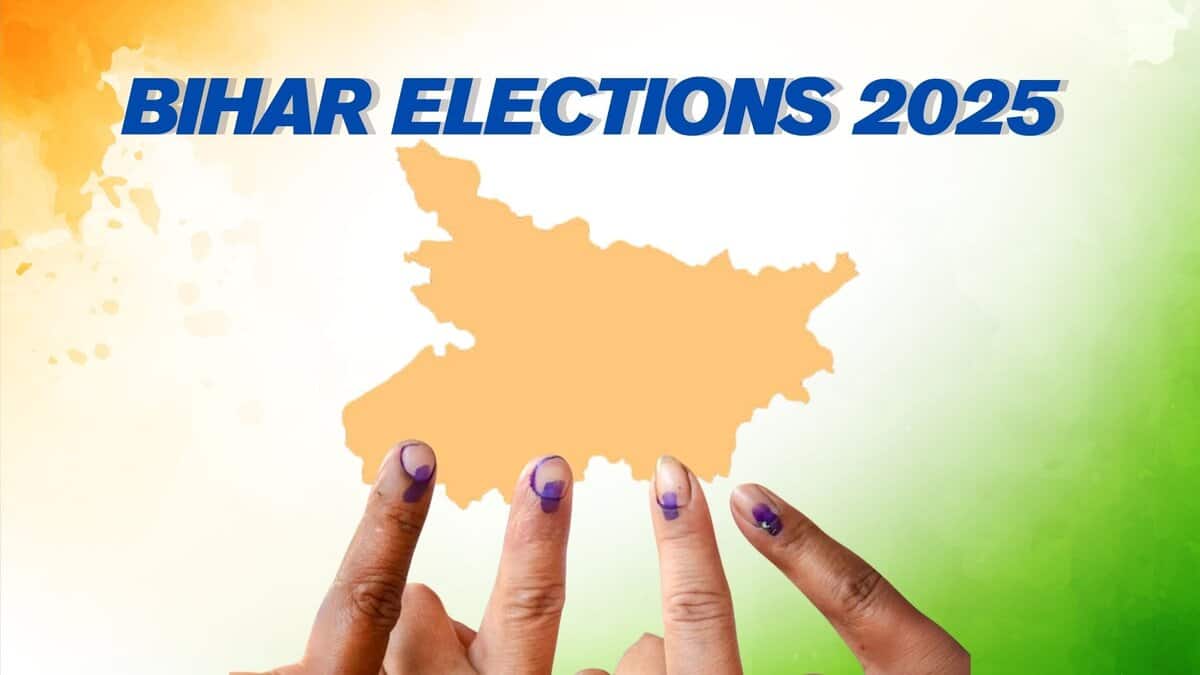
Union Home Minister Amit Shah’s assertion on 16 October that the newly elected legislators of the National Democratic Alliance (NDA) in Bihar would decide on the choice of chief minister has sparked a storm in the ruling combination in the state. At the same time, his statement is also being equated with the remarks made by Rashtriya Swayamsevak Sangh (RSS) chief Mohan Bhagwat on the eve of the 2015 Assembly poll, in which he sought a review of the reservation policy. As if that was not enough, came the Diwali-eve public appeal of former Union minister and senior BJP leader R. K. Singh to reject candidates like deputy chief minister Samrat Choudhary and don-turned-politician Janata Dal (United) (JD(U)) nominee from Mokama, Anant Singh, considered close to Chief Minister Nitish Kumar.
Though the Grand Alliance of Rashtriya Janata Dal (RJD), Janata Dal (United) and Congress were well placed in 2015, many political pundits are of the view that Bhagwat’s mistimed call significantly damaged the Bharatiya Janata Party (BJP)-led National Democratic Alliance. The saffron party won 53 seats, while its partners won only five others.
Bhagwat thought that he would succeed in further consolidating the votes of the 10.6% upper castes for the NDA, not knowing that he would end up pushing the backward castes into the lap of the Grand Alliance. What he failed to realise is that the upper castes have already been the BJP’s vote bank; therefore, there was no need for such an outlandish demand at this point in time.
Self-Goal by Shah
Similarly, Amit Shah’s much-publicised view, expressed in a programme organised by a premier television channel, has the potential to cancel out the edge the NDA established after the distribution of freebies to women by the Nitish Kumar government, to be followed by the dilly-dallying attitude adopted by the Grand Alliance on the announcement of seat sharing. Never in any election anywhere in India has the NDA gone to the polls with such a lack of cohesion and mistrust among its constituents. Shah has further aggravated the uncertainty over the name of the chief minister if it is voted back to power. The BJP number-two may have said so to generate enthusiasm among his own party rank and file, but it is likely to dampen the spirit of those hard-core supporters of Nitish who only vote for him and not the BJP. Once they get a message that the Janata Dal (United)’s supremo is not going to become CM, they would shift to another alternative or would opt not to exercise their adult franchise. In this neck-and-neck tussle, any decision to stay away from polling by even a small number of JD(U)’s supporters may cost the NDA dearly.
The Grand Alliance camp, which was confused and a bit despondent over the delay in announcing the seat-sharing formula, suddenly finds itself energised by this public declaration of the BJP’s Chanakya. The opposition bloc has been offered an issue on a platter.
An upset Nitish has his own style of paying back. He reportedly gave only 15 minutes to Amit Shah when he called on the former on 17 October. He did not share the dais with the home minister, who addressed two election meetings in the state later in the day. Though officially the Janata Dal (United) has not reacted sharply, off the record many party office-bearers are furious. They did not hesitate in accusing working president Sanjay Kumar Jha, Union minister Lallan Singh and Vijay Chaudhary, minister in the Bihar cabinet, of conspiring against the chief minister. There is no dearth of Janata Dal (United) workers who strongly feel that there is a sinister design to declare Nitish mentally ill and keep him away from campaigning. “No, he is perfectly all right. It is those close to him who are working on behalf of the BJP and are giving him sleeping pills. Whenever Nitishji recovers, another dose of medicine is administered to him,” one of them was quoted in the media.
Even Union minister and Hindustani Awam Morcha patron Jitan Ram Manjhi expressed concern over Shah’s statement and added that it would cause a lot of confusion among the NDA supporters.
Curiously, this development took place just days after Nitish expressed his strong displeasure over the way 101 seats were shared each by the BJP and JD(U). Media reports suggest that he summoned Sanjay Kumar Jha and Lallan Singh and rebuked them. He asked how nine sitting MLAs, including ministers, were denied tickets.
No scope for feel-good
At the time when Nitish was pulling up his own party’s top leaders on why he was kept in the dark and why the decision on the seat-sharing arrangement was made in Delhi and not in Patna, loud-mouthed BJP leader and Union minister Giriraj Singh directly opened a front against the Janata Dal (United) as he warned his own bigwigs not to remain in a ‘feel-good’ state, otherwise the NDA would meet the fate of 2004 when Prime Minister Atal Bihari Vajpayee-led conglomeration suffered a surprise defeat.
While the NDA was in turmoil, the electronic media tried to ‘manage’ this news by giving excessive coverage to the tussle within the Grand Alliance over the finalisation of seats.
Even when the crisis within the NDA was highlighted by some television channels and YouTubers, efforts were made to make Lok Janshakti Party chief Chirag Paswan a favourite whipping boy. The truth is that the tussle is directly between the BJP and JD(U), and Chirag is just being made a scapegoat. (For more on tensions involving Chirag Paswan, see this Indian Express analysis.)
But Amit Shah dropped a bombshell on 16 October. What he is perhaps not understanding is that if the presence of 135 LJP candidates in 2020 badly marred the poll prospects of the NDA, which could win by only a slender margin, what will happen if the two main constituents of the ruling conglomeration go to the polls with the main objective of weakening each other.
Old guards marginalised
The problem with the Bihar BJP is that there is no figure like former deputy chief minister Sushil Kumar Modi, an RSS man with enough organisational experience—a quality very much essential at the time of election. At the veritable battleground, there is no seasoned commander to lead the BJP war machine, which has lost its utility ever since the advent of demagogues and rabble-rousers.
The late Modi had a very good equation with Nitish even when he had in between left the NDA. The central leadership of the party has clipped the wings of the old guards such as Speaker of the House Nand Kishore Yadav, who has been denied a ticket, and former Union ministers Ashwini Choubey, Ravi Shankar Prasad, etc. So, there is no one to bring about a truce.
The present deputy chief ministers Samrat Choudhary and Vijay Kumar Sinha are no match for Sushil Modi. Till 24 January 2024, they had been hurling choicest abuses at Nitish even when the central leadership had a day earlier publicly hinted at his homecoming to the NDA by announcing the Bharat Ratna to the late CM Karpoori Thakur.
Vowing to remove Nitish from power, Samrat Choudhary had earlier started wearing a turban. But when the high command asked him to fall in line, both he and Vijay Kumar Sinha took oath as deputy chief ministers under Nitish on 28 January 2024.
Notwithstanding all these tantrums for public consumption, the controversial Samrat has not been fully integrated into the party, as till 2017 he had been in the Janata Dal (United) and earlier with the RJD. His past record is also forcing many old partymen to maintain distance.
Needless to remind, Sushil Kumar Modi way back in 1999 led a vociferous campaign compelling the then chief minister Rabri Devi to drop Samrat Choudhary from her cabinet as his birth certificate was said to be forged. Now Jan Suraaj Party founder Prashant Kishor has come up with the allegation that he has a fake educational certificate. PK had also hurled heinous criminal charges against him.
R. K. Singh factor
Now R. K. Singh has landed the NDA in further trouble by calling for Samrat Choudhary’s defeat. True, he had taken the name of several other candidates, including those of a couple of opposition parties, yet his direct attack on the BJP top brass has come as a shock. He questioned how Vibha Devi, the wife of rape-accused Raj Ballabh Yadav, shared the stage with Prime Minister Narendra Modi when he visited Bodh Gaya on 22 August. Vibha is the BJP’s candidate from Nawada. Last time she won on an RJD ticket and crossed over to the saffron party after her husband got bail.
Singh’s anger has a political reason too. In the 2024 Lok Sabha election, a lobby within the BJP put up Bhojpuri singer Pawan Singh as an Independent candidate from the Karakat seat, from where Upendra Kushwaha, president of Rashtriya Lok Morcha (an NDA constituent), was contesting. Pawan Singh was earlier fielded as a BJP candidate from Asansol but was later asked to withdraw his candidature. His presence in the fray from Karakat created confusion, and a big chunk of Rajput votes went in favour of him. Upendra Kushwaha ultimately lost. In the neighbouring Ara seat, from where R. K. Singh, also a Rajput, was a BJP candidate, voters belonging to the Kushwaha caste took revenge. They threw their lot behind the CPI(ML) candidate, leading to the defeat of the Union electricity minister.
Just after the parliamentary election, an embarrassed central leadership of the BJP swung into action and sent Upendra Kushwaha to the Rajya Sabha on the party ticket. Not only that, the then state president Samrat Choudhary, also a Kushwaha, was asked to resign.
In the Assembly election a year later, the NDA, which maintained an initial lead in the relay race, appears to be tumbling midway because of the absence of cooperation and coordination among the team members. If it really loses the election, no one but the saffron brigade may be held responsible. And if the NDA wins, there is no guarantee of the Nitish-led JD(U) remaining in the alliance. Anything can happen.


